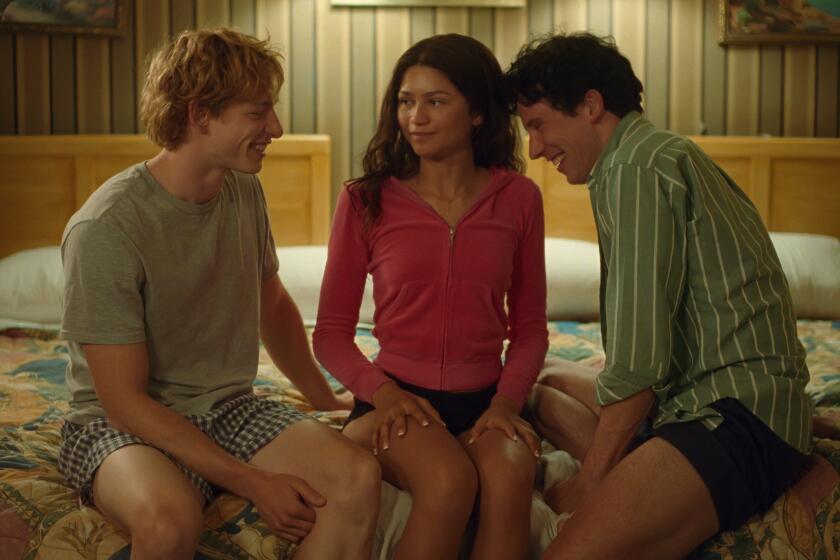Lijadu Sisters are on the comeback trail
One spring day in 2009, William Glasspiegel sat in the Harlem apartment of Taiwo and Kehinde Lijadu. It was the culmination of an intensive, several-week search since he’d heard the Nigerian twin sisters’ long-forgotten 1976 debut album, “Danger,” via a music blog.
“Drank a glass of Carl Rossi with them, surrounded by images and icons and living memories of their life,” he says, recalling photos of Michael Jackson on the walls of their apartment amid a wealth of African religious items. “They talked to me about spending time with James Brown and [the late Afrobeat superstar] Fela in Lagos. But they talked to me most about their mother and the importance of family.”
Then, spontaneously, they broke into song.
“When I heard them sing it was like hearing Ella Fitzgerald,” he says.
With that began the reemergence of the Lijadu Sisters, ending decades of virtual seclusion and obscurity after their promising career was sidetracked first by music business treachery and then a devastating accident. “Danger” has just been reissued by New York’s Knitting Factory Records, with the duo’s three subsequent albums set for reissue in the course of 2012. Together they present an Afrobeat epiphany, a catalog of distinction and vision with a story to match.
It’s not that they didn’t want to be found. They were found many times, they say. Just not by the right person.
“He wasn’t the first to call,” Taiwo says. “Many people had called. We had seen them. We had spoken. But the feeling wasn’t mutual. When William called and said he had heard our songs, we felt we could work with him.”
Cousins of Fela Kuti, the sisters — now 63 — had been singing since childhood, encouraged by their mother.
“Our mother was one of a kind in a million,” Taiwo says. “She listened to us sing and recognized it was our calling.”
“She pointed us in the direction,” says Kehinde. “She inspired us. Brought us records by the local artists from Nigeria and West Africa, and Aretha Franklin, Ray Charles. We took it from there and developed our own style.”
After success in Lagos, they first traveled to Europe and North America in 1972 as part of former Cream drummer Ginger Baker’s group Salt (Kehinde was in a relationship with Baker) and returned to the U.S. in 1988 with King Sunny Ade. Their four ‘70s albums had made them stars at home and they seemed poised for an international breakthrough. With proposals for U.S. deals on the table, they stayed in New York.
But the deals fell through and, feeling record companies had been “stealing” from them, they settled in New York to pursue ventures in herbal remedies related to their Yoruba religion. Then in 1996 Kehinde suffered a serious pelvic and spinal injury in a fall.
They used her long recovery time as an opportunity to strengthen their connections with the local African culture communities and their families (each has grown children and several grandchildren). Their song “Life’s Gone Down Low,” from “Danger,” made it onto a 2005 Luaka Bop label compilation of African “psychedelic” rock, and from there was liberally sampled by rapper Nas for his 2006 hit of the same name (without the sisters’ knowledge and much to their dismay).
Still, the sisters themselves remained unknowns, despite the late 2000s boom time for classic Nigerian rock, soul and funk, with the “Fela!” musical hitting Broadway and a seemingly endless stream of reissue anthologies coming out. Even Glasspiegel, a reporter and critic for National Public Radio and Afropop Worldwide who had also worked with various African artists as a manager and advisor, had never heard the Lijadu Sisters’ music before this.
“At that moment everyone was talking about Fela, and all those ‘70s psychedelic African reissues were popular,” he says. “Here was this album ‘Danger’ that was different from any of that but related. Their songs have a timeless quality.”
Glasspiegel, who no longer works with the sisters, brought them to Knitting Factory, which was reissuing the Fela Kuti catalog and had signed his sons, Femi and Seun, for their separate projects. Label manager Tim Putnam tracked down copies of the albums in good enough shape to be restored to release quality, because the master tapes were long lost.
“There’s a periphery of music that exists in the shadow of myth,” Putnam says. “You kind of romanticize those artists, and I certainly do. But what stood out for me was this catalog of four albums that are incredible. Strange to me that I hadn’t heard it. To me it sounds like music that could come out now.”
The music supports his enthusiasm. “Danger” (just available now) brings a crisp rock edge to the West African pulse, produced imaginatively by family friend Biddy Wright, all set behind the sisters’ alternately playful and forceful duets. The 1977 follow-up, “Mother Africa” (coming in late February), largely strips the sound to a compelling, minimalist mix of drums, both African and Western, with electric guitar and keyboard ornamentation. The next year’s Wright-produced “Sunshine” (due in the spring) takes disco twists that today sound compelling without ever drifting into camp. And 1979’s “Horizon Unlimited” (summer or fall) again emphasizes the drums behind vocals that had grown in confidence and power.
Songs alternate between English and local languages, much with the same steely eye on corruption and injustice that fueled Fela’s music. “Life’s Gone Down Low,” for example, addresses global economic issues still relevant today. .
The time is right for a return, they believe.
“We are looking forward to forming our own band,” Kehinde says. “Perhaps playing in town, Manhattan, until my full recovery. We can do small tours as our bodies permit. But first we want to test the waters.”
Meanwhile, they sing every day (and do, briefly and beautifully, during the phone call) and have turned the experiences and observations of their time in the shadows into dozens of new songs.
“We were doing other things of interest that would support us,” Taiwo says. “In the process of that, a lot of new songs got written and they are strong. They are exciting. And they give us hope.”
More to Read
The biggest entertainment stories
Get our big stories about Hollywood, film, television, music, arts, culture and more right in your inbox as soon as they publish.
You may occasionally receive promotional content from the Los Angeles Times.










